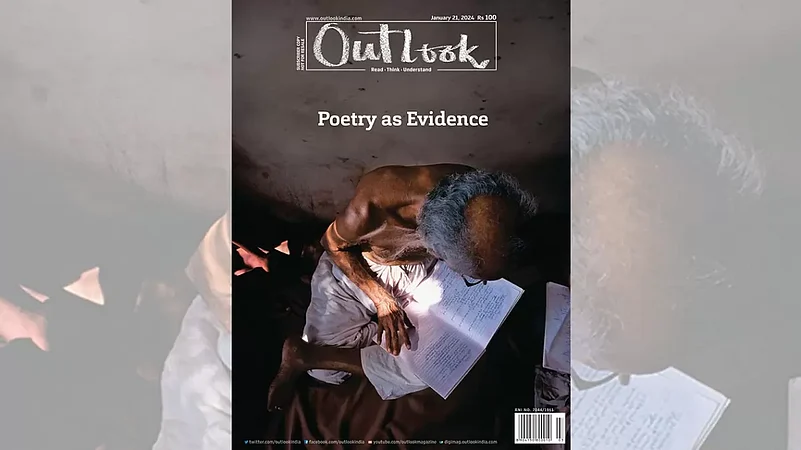Poems On Azaadi And Doomsday From Kashmir
Through 100 pages of 'Poetry as Evidence', Outlook presents a selection of poems and verses that have moved us, and we feel these serve as evidence of our bleak times and lives. The poems below are the 28th and 29th from the series.

Mother walks through a military curfew upon shattered windows
bearing no address. Upon little rocks still lugging the memory of the
mountains they once were a part of. The phantom city, a thousand
quivering lips, stammer into my ears through the long distance
phone call punctuated with time lags, in many a broken languages
that a native speaks.
Qayamat gai, Qayamat cha gasaan, Qayamat Karekh
In Kashmir, the Doomsday transforms from a noun to verb. From a
day to the everyday.
Distance is directly proportional to Time.
Mourners extend their empty palms across miles,
beckoning me to complete the semi-circle, the arch of singing bodies—bridges
over a river of bruised metaphors, so they can begin to
move to and fro around the dead and sing till nights and days turn
to dust in their embrace.
I ache to plant nun posh, aeshq pechaan, aarval, in this dust. There is
a poem somewhere in the folds of this ache. But what is inside the
ache itself?
Speed is inversely proportional to Time.
I steal a palmful of clouds of home skies and walk away
like a gravedigger walks away after a day’s work.
Uzma Falak, Jammu & Kashmir
(Born and raised in Srinagar, Uzma Falak is pursuing her doctoral studies in anthropology at the University of Heidelberg, Germany, and she teaches at the University of Tübingen, Germany. Her poetry, articles, essays, and reportage have appeared in several publications.)
Azadi Ba Waqt-e-Taqseem-e-Hind (Freedom at the Time of the Partition of India)
Sana saeri pariw sanyen garan manz xhai Azaedi
Setha yexhkael Asi kun jalwi hawan aayi Azaedi
Yi Azaedi goni yeli drayi naen Hindostanas manz
Lachaw paeth aayi insaanon ladan tili krayi Azaedi
Yi Azaedi chey trawan magribas kun rehmatuk baran
karan saenis zameenas pyeth xcharey gagrayi Azaedi
Gareebi, muflisi be booj saet hyeth khani waeraeni
Ami rixhi trayi asi pyeth aayi trawan saayi Azaedi
Yimai cheez asi golaman aes zaelim zori moel hyawan
Kenan ti bazran andar kerith muli mayi Azaedi
Xhe kyah boozith yi Azaedi yi cha kari muth kinun bazaar
Chey retmich hotlan manz, Aayi liptan chayi Azaedi
Yi Azaedi chey kukraan jaan sununa sand thol keena traavan
Tumay keena thol heath wan beith maj bee’ah paraya azadi
Yi Azaedi chey surgach hor phir khanai pati khanai
Faqat kehnxhan gran andar chey maran grayi Azaedi
Yi Azaedi dapan sarmayi daeri chyeni kuni thawin
Won paninyen nishi chey sombrawan hyewan sarmayi Azaedi
Lukan pyeth geyi yi Azaedi setha gob haari parbat zan
Chey kehnxhan khosh naseebaan poshi tul zye dayi Azaedi?
Ladan yeli haeal tai chakdaar walan akh akis rath tim
Tamasha chyekh loti paeth roozith xhayi Azaedi
Lukan matam, garan andar bihith mahraazz hi haekim
yimow retmixh chey panas saet khalwat shayi Azaedi
Gareeban warasi karihan magar cheyni haekiman fursat
timaw laeb motran andar dawan thadi payi Azaedi
Gaemit dam phaet chi saeri be qaraeri chyekh dilan andar
Dapan wani haw panun ahwal asi ma layi Azaedi
Ladith mujwazi wanan aes grees kehn shaamas khalas andar
Duwith phael phael niyikh asi phokh ti phash hyeth drayi Azaedi
Hyawan aes praen zaelim aeth khaer asi zori hot cheerith
Xhowah khaer dith sapin azad, gari soen xhayi Azaedi
Satan jayan kaxhan kerhas talaeshi tomli mochi bapath
photyen manz aen tulith puxhi xhayi aaram bayi Azaedi
Nabir Sheikh zaani kathi hund maani, tas xeal khaandarin hyeth
Su gow feryaed, paet kin looki hinzi gahari pyayi Azaedi
Rachan kotar, kokar leader, gareeb ladi phaaki geyi abtar
Yohoy insaaf hyeth mulkas andar aayayi Azaedi,
Bachaw yod wugri baapath phal trakha kahn thow zameenas tal
Chi aes khoxan khabar cha nyeri ma wugrayi Azaedi
Yi polo groundas manz xayi tati beeth shali gophi andar
Tawai shahras andar shamas karan wungirai Azaedi
Let us all offer prayers as Azadi has enters our homes;
It is after ages that she has beamed her radiance on us.
When this Azadi came to surface in India for the first time
Lakhs of people were boiled in oil
This freedom bestows kindness upon the West,
But on our soil, it merely echoes hollowly.
Poverty and hunger, oppression and chaos,
With these joyous blessings, she has arrived to us
The things that oppressors would purchase from us–their slaves,
Now the same are sold in the market after haggling as freedom
“What have you heard? Is this Azadi selling peas in the bazaar?
This Azadi has been taken over in hotels with Lipton tea.”
This freedom is like a dog’s tail that wags in any direction
You sit on any throne, but I have a more precious freedom
This freedom is like a bird that flies around from one family to another
This Azadi is only found in a few houses, flowing and gushing
This Azadi claimed there will be no capitalism,
Yet now this Azadi is amassing capital within a few clans
This Azadi has become as weighty as a mountain on people
Only a few fortunate ones possess it, like a handful of flowers.
While these landlords were engaged in battles with each other,
Azadi watched them from a distance, clandestinely? and silently?
People are mourning, and the rulers are sitting like grooms in their houses
They have kept Azadi with themselves in solitary seclusion
They could have shown compassion to the poor, but rulers have no time
They’ve placed Azadi in their swiftly moving cars
Everyone feels suffocated, and their hearts are restless
They want to open up, but they fear Azadi may beat them
Some of the farmers were conversing in their granary during the evening isolation
That they have taken every grain from them, and along with it, Azadi departed.
The old oppressors took grains from us after choking our throats,
We provided a large granary, and Azadi entered our homes
At seven places, our armpits were searched for a handful of grain
In a wicker basket, beneath her headscarf, a peasant woman took Azadi
Nabir Sheikh knows the meaning of things, but his wife was taken away
He went to plead for her recovery, and Azadi was born in a stranger’s home
The leaders are raising pigeons and poultry, while the poor sink deeper into starvation
With this justice, Azadi entered the land
If some grain was left for cooking rice, it was buried beneath the earth
We fear that Azadi might come knocking at our doors as a debt collector
It entered the polo grounds and settled in the fox’s den,
That’s why in the evening, Azadi is barking in the city
—Translated from Kashmiri
Pirzada?Ghulam?Ahmad (Mahjoor), Jammu & Kashmir
(Mahjoor is considered the torchbearer of Kashmiri literature’s renaissance. Born as Pirzada Ghulam Ahmad in 1885, his contributions were not limited to Kashmiri alone; he also made significant strides in Persian and Urdu poetry. His major themes revolve around freedom, progress, and an awakening of nationalist fervour among Kashmiris.)





















